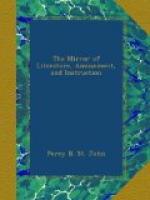precedent or tradition, without that rooted stock
on which freedom, in order to grow and bear fruit,
must be grafted,—was a conception which,
however familiar to our age, was utterly unknown,
and impracticable to that of Richelieu. With
the horrors of civil war fresh in the memory of all,
the general desire was for tranquillity and peace,
not liberty; to which, moreover, had it been contemplated,
the first necessary step was that of humbling the
aristocracy. It was impossible that constitutional
freedom could grow out of the chaos of privileges,
and anarchy, and organized rebellion, that the government
had to contend with. In building up her social
fabric France had in fact gone wrong, destroyed the
old foundations, and rebuilt on others without solidity
or system. To introduce order or add solidity
to so ill-constructed a fabric, was impossible; Richelieu
found it necessary to raze all at once to the ground,
except the central donjon of despotism, which he left
standing. Had Richelieu, with all his genius
and sagacity, undertaken for liberty what he achieved
for royalty, his age would have rejected or misunderstood
him, as it did Bacon and Galileo. He might, indeed,
as a man of letters, have consigned such a political
dream to the volume of an Utopia, but from action or
administration he would have been soon discarded as
a dreamer. Liberty must come of the claim of
the mass; of the general enlightenment, firmness,
and probity. It is no great physical secret, which
a single brain, finding, may announce and so establish:
it is a moral truth, which, like a gem, hides its
ray and its preciousness in obscurity, nor becomes
refulgent till all around it is beaming with light.—
Cabinet
Cyclopaedia—History of France.
* * * *
*
THE GATHERER.
A snapper up of unconsidered trifles.
SHAKSPEARE.
* * * *
*
From what town in England does all the butter come
in the London market?—Cowes.
Which is the closest town in Ireland, and is the best
when drawn?—Cork.
A Dirty Member.—A member of a certain
house was noticed the other night to be very dirty
in his appearance, which a wit accounted for by saying
he supposed the gentleman had been assisting the Chancellor
of the Exchequer in taking the duty off coals!—From
“the Age."
* * * *
*
LUXURY
Was once restricted by an English law, wherein the
prelates and nobility were confined to two courses
at every meal, and two kinds of food in every course,
except on great festivals: it also prohibited
all who did not enjoy a free estate of L100. per annum,
from wearing furs, skins, or silk, and the use of
foreign cloth was confined to the royal family alone,
to all others it was prohibited, 1337. In 1340,
an edict was issued by Charles VI. of France, which
says, “Let no one presume to treat with more
than a soup and two dishes.”




